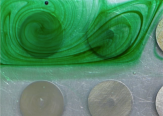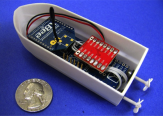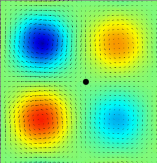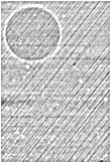Philip Yecko
Professor of Physics
Chair of Physics
Professor Philip Yecko's main area of interest is fluid dynamics. Phil has worked on astrophysical, biological, geophysical, magnetic and multi-phase fluid dynamics, studying flows of accretion disks, atomization and sprays, bubbles, droplets, coherent structures, mixing and vortices in the ocean, convection, pulsation and turbulence in stars, magnetic drug delivery, ferrofluids, suspension rheology and pattern-forming instabilities. Students interested in this sort of research are encouraged to get involved.
Prof. Yecko's research benefits from a three-fold approach: combining mathematical and theoretical methods, such as asymptotic models and stability theory, together with computational models, including direct numerical simulations, and laboratory experiments. Phil has an ongoing experimental program at the Advanced Photon Source, Argonne National Lab, and is a regular participant in the Geophysical Fluid Dynamics summer program at the Woods Hole Oceanographic Institute (GFD). Phil also has active collaborations with researchers in Italy, France and at several U.S. universities.
Phil enjoys teaching a wide variety of courses in fluids, physics, astrophysics, nonlinear dynamics and numerical modeling and simulation, and has previously taught at Trinity College Dublin, Columbia, M.I.T., Montclair State and Università Napoli Federico II, Italy, primarily undergraduate but also graduate and PhD level courses. Most recently, Phil has developed and taught a hybrid-online course in advanced computational modeling and, at Cooper, is teaching Physics Lab and Modern Physics.
Prof. Philip Yecko earned his Ph.D. from Columbia University and his S.B. in physics from M.I.T.
Projects
-

Transport in Stochastic and Time-Dependent Flows
-

Magnetic Fluids: Flow, Rheology, and Simulation
Back
Transport in Stochastic and Time-Dependent Flows
-

CoFPhE Lab: experiment on magnetic control of 800 micron diameter paramagnetic sphere in a time-dependent four-gyre flow
-

CoFPhE Lab: Sixteen gyre flowtank with independent stepper-motors and controllers for eight left gyres and eight right gyres
-

Drexel SAS Lab: robotic boat, first generation
-

CoFPhE Lab: PIV of a time-dependent four-gyre flow showing velocity vectors, vorticity (color) and hyperbolic fixed point
-

NASA Perpetual Ocean visualization of ECCO2 data
Improved understanding of transport in the ocean will not only enable better modeling and prediction, but is also a necessary component of robotic monitoring in complex fluid environments in the ocean or on any scale.
Funded by the National Science Foundation, The Complex Fluid Physics and Engineering (CoFPhE) Lab offers opportunities for students to do experimental, computational and theoretical research at both the graduate and undergraduate level. Work in the lab involves designing flow apparatus; using laser- and LED-based particle imaging velocimetry (PIV) systems; assessing model accuracy and studying predictability of dynamical systems; and quantifying complex system behavior using mathematical models.
For more information about the CoFPhE lab, as well as collaborations with other universities, visit Prof. Yecko's faculty page.





